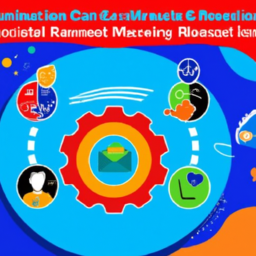The Benefits of Integrating CRM and Marketing Automation
Are you looking for a way to streamline your marketing efforts, improve customer relationships, and boost your business productivity? If so, integrating Customer Relationship Management (CRM) with Marketing Automation could be the game-changer you’ve been waiting for.
What is CRM and Marketing Automation?
Let’s start with a brief explanation of CRM and marketing automation. CRM is a system that helps businesses effectively manage their customer data, interactions, and relationships. It allows you to centralize customer information, track sales leads, manage customer support, and more.
On the other hand, marketing automation refers to the use of technology to automate repetitive marketing tasks. It enables businesses to target and engage prospects with personalized messaging at different stages of the customer journey. Marketing automation tools often include features like email marketing, lead nurturing, campaign management, and analytics.
The Power of Integration
Integrating CRM with marketing automation brings several benefits that can greatly impact your marketing and sales efforts. Let’s take a closer look at some of these advantages:
1. Enhanced Customer Insights
Integrating CRM and marketing automation allows you to gain a more comprehensive understanding of your customers. By combining data from both systems, you can track customer interactions, preferences, purchase history, and engagement across multiple channels. These insights enable you to create more targeted and personalized marketing campaigns, resulting in higher engagement and conversion rates.
2. Streamlined Lead Management
When CRM and marketing automation work together, you can seamlessly transfer leads between systems, ensuring a smooth handoff from marketing to sales. As leads move through the marketing funnel, data is automatically updated in CRM, providing your sales team with real-time information on lead nurturing efforts. This integration eliminates manual data entry, reduces the risk of data loss, and enables faster response times to potential customers.
3. Automated Workflows
By integrating CRM with marketing automation, you can automate various marketing tasks and workflows. For example, based on specific triggers or customer behavior, you can automatically send personalized emails, notify your sales team about new leads, schedule follow-up actions, and more. This automation saves time, reduces errors, and ensures consistent communication and engagement with your leads and customers.
4. Improved Marketing ROI
Integrating CRM and marketing automation provides you with a unified view of your marketing and sales efforts. With access to data on customer behavior, engagement rates, and revenue generated from various campaigns, you can easily analyze and measure the effectiveness of your marketing strategies. This insight allows you to optimize your campaigns, identify areas for improvement, and allocate your resources more efficiently, ultimately resulting in better return on investment (ROI).
5. Personalized Customer Experience
With CRM and marketing automation integration, you can deliver personalized content and experiences to your customers at the right time. By leveraging customer data, you can tailor your messaging based on customer interests, preferences, and behavior. This personalization not only enhances customer satisfaction but also increases the likelihood of conversions and repeat business.
Final Thoughts
Integrating CRM with marketing automation enables businesses to streamline their marketing efforts, improve customer relationships, and boost their overall productivity. By gaining a deeper understanding of customers, automating processes, and delivering personalized experiences, you can enhance the effectiveness of your marketing campaigns and drive significant business growth.
If you’re ready to take your marketing and sales to the next level, consider integrating CRM and marketing automation. It may just be the game-changer your business needs.











